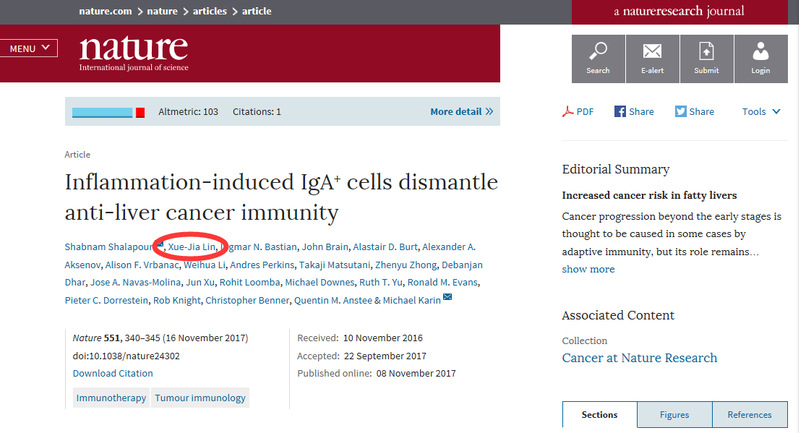- ABOUT JNU
- ADMISSION
-
ACADEMICS
- Schools and Colleges
-
Departments and Programs
- Arts College of
- Chinese Language and Culture College of
- Economics College of
- Electrical and Information Engineering College of
- Foreign Studies College of
- Information Science and Technology College of
- Environment School of
- Humanities School of
- International Business School
- International Studies School of
- Journalism and Communication College of
- Law School
- Liberal Arts College of
- Life Science and Technology College of
- Management School of
- Marxism School of
- Medicine School of
- Pharmacy College of
- Physical Education School of
- Science and Engineering College of
- Shenzhen Tourism College
- Research Institute
- Research Center
- Programs in English
- Majors
- Study Abroad
- Online Learning
- RESEARCH
- CAMPUS LIFE
- JOIN US
JNU researcher publishes in Nature
Time: Nov. 13, 2017
Source: Institute of Biomedical Transformation
Author: Wang Zhengkun
Publisher: News Center
Associate researcher Lin Xuejia of Institute of Biomedical Transformation of JNU, as a second author, has published an article named Inflammation-induced IgA+ cells dismantle anti-liver cancer immunity in Nature.

The role of adaptive immunity in early cancer development is controversial. The paper shows that chronic inflammation and fibrosis in humans and mice with non-alcoholic fatty liver disease is accompanied by accumulation of liver-resident immunoglobulin-A-producing (IgA+) cells. These cells also express programmed death ligand 1 (PD-L1) and interleukin-10, and directly suppress liver cytotoxic CD8+ T lymphocytes, which prevent emergence of hepatocellular carcinoma and express a limited repertoire of T-cell receptors against tumour-associated antigens. Whereas CD8+ T-cell ablation accelerates hepatocellular carcinoma, genetic or pharmacological interference with IgA+ cell generation attenuates liver carcinogenesis and induces cytotoxic T-lymphocyte-mediated regression of established hepatocellular carcinoma. These findings establish the importance of inflammation-induced suppression of cytotoxic CD8+ T-lymphocyte activation as a tumour-promoting mechanism.
Lin visited a laboratory in Medical College of University of California, San Diego in Apr. 2016, led by distinguished professor Dr.Michael Karin, and pursued further study there. During the process of academic visit, she gained the financial support of 111 program (B16021)---The base of discipline innovation and talent introduction of higher education.
The link to the paper:
http://www.nature.com/articles/nature24302
NEWS
- About the University
- Quick Links
Copyright © 2016 Jinan University. All Rights Reserved.




